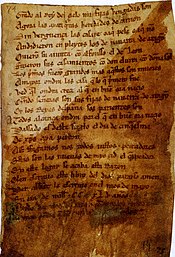
Back هسبانيات Arabic Hispanismu AST Hispanística Catalan Hispanistik German Ισπανικές Σπουδές Greek Hispanismo Esperanto Hispanismo Spanish Hispanismo Basque Hispanisme French Hispanisme ID
This article needs additional citations for verification. (May 2011) |
Hispanism (sometimes referred to as Hispanic studies or Spanish studies) is the study of the literature and culture of the Spanish-speaking world, principally that of Spain and Hispanic America. It may also entail studying Spanish language and cultural history in the United States and in other presently or formerly Spanish-speaking countries in Africa, Asia, and the Pacific, such as Equatorial Guinea and the former Spanish East Indies.
A hispanist is a scholar specializing in Hispanicism.[1] It was used in an article by Miguel de Unamuno in 1908[2] referring to 'el hispanista italiano Farinelli', and was discussed at length for the U.S. by Hispanist Richard L. Kagan of Johns Hopkins University.[3] The work carried out by Hispanists includes translations of literature and they may specialize in certain genres, authors or historical periods of the Iberian Peninsula and Hispanic America, etc.
- ^ J. H. Elliott, History in the Making, New Haven: Yale University Press 2012, p. 220 fn. 20.
- ^ Miguel de Unamuno, 'Sobre Don Juan Tenorio', La Nación (Buenos Aires), 24/02/1908. Reproduced in Miguel de Unamuno, Mi religión y otros ensayos breves, 4ª ed. Madrid: Espasa-Calpe, 1964, p. 99.
- ^ Richard L. Kagan, ed. Spain in America: The Origins of Hispanism in the United States. Urbana and Chicago: University of Illinois Press 2002.
